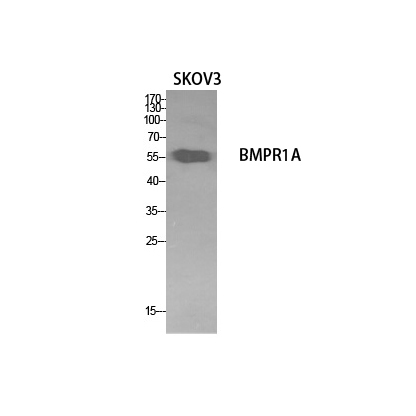CD292 Polyclonal Antibody
- Catalog No.:YT5528
- Applications:WB;ELISA
- Reactivity:Human;Rat;Mouse;
- Target:
- CD292
- Fields:
- >>Cytokine-cytokine receptor interaction;>>TGF-beta signaling pathway;>>Hippo signaling pathway;>>Signaling pathways regulating pluripotency of stem cells;>>Fluid shear stress and atherosclerosis
- Gene Name:
- BMPR1A
- Protein Name:
- Bone morphogenetic protein receptor type-1A
- Human Gene Id:
- 657
- Human Swiss Prot No:
- P36894
- Mouse Gene Id:
- 12166
- Mouse Swiss Prot No:
- P36895
- Rat Gene Id:
- 81507
- Rat Swiss Prot No:
- Q78EA7
- Immunogen:
- The antiserum was produced against synthesized peptide derived from the N-terminal region of human BMPR1A. AA range:1-50
- Specificity:
- CD292 Polyclonal Antibody detects endogenous levels of CD292 protein.
- Formulation:
- Liquid in PBS containing 50% glycerol, 0.5% BSA and 0.02% sodium azide.
- Source:
- Polyclonal, Rabbit,IgG
- Dilution:
- WB 1:500 - 1:2000. ELISA: 1:20000. Not yet tested in other applications.
- Purification:
- The antibody was affinity-purified from rabbit antiserum by affinity-chromatography using epitope-specific immunogen.
- Concentration:
- 1 mg/ml
- Storage Stability:
- -15°C to -25°C/1 year(Do not lower than -25°C)
- Other Name:
- BMPR1A;ACVRLK3;ALK3;Bone morphogenetic protein receptor type-1A;BMP type-1A receptor;BMPR-1A;Activin receptor-like kinase 3;ALK-3;Serine/threonine-protein kinase receptor R5;SKR5;CD292
- Observed Band(KD):
- 60kD
- Background:
- The bone morphogenetic protein (BMP) receptors are a family of transmembrane serine/threonine kinases that include the type I receptors BMPR1A and BMPR1B and the type II receptor BMPR2. These receptors are also closely related to the activin receptors, ACVR1 and ACVR2. The ligands of these receptors are members of the TGF-beta superfamily. TGF-betas and activins transduce their signals through the formation of heteromeric complexes with 2 different types of serine (threonine) kinase receptors: type I receptors of about 50-55 kD and type II receptors of about 70-80 kD. Type II receptors bind ligands in the absence of type I receptors, but they require their respective type I receptors for signaling, whereas type I receptors require their respective type II receptors for ligand binding. [provided by RefSeq, Jul 2008],
- Function:
- catalytic activity:ATP + [receptor-protein] = ADP + [receptor-protein] phosphate.,cofactor:Magnesium or manganese.,disease:A microdeletion of chromosome 10q23 involving BMPR1A and PTEN is a cause of chromosome 10q23 deletion syndrome [MIM:612242]. This syndrome shows overlapping features of the following three disorders: Bannayan-Zonana syndrome, Cowden disease and juvenile polyposis syndrome. The 10q23 microdeletion is also found in patients manifesting juvenile polyposis of infancy without cognitive disability. Juvenile polyposis of infancy is characterized by the appearance of extensive gastrointestinal juvenile hamartomatous polyposis in the first months of life.,disease:Defects in BMPR1A are a cause of Cowden disease (CD) [MIM:158350]. CD is an autosomal dominant cancer syndrome characterized by multiple hamartomas and by a high risk for breast, thyroid and endometrial cancers.,dise
- Subcellular Location:
- Cell membrane ; Single-pass type I membrane protein . Cell surface .
- Expression:
- Highly expressed in skeletal muscle.
Caveolin-1 affects tumor drug resistance in esophageal squamous cell carcinoma by regulating expressions of P-gp and MRP1. TUMOR BIOLOGY Tumor Biol. 2016 Jul;37(7):9189-9196 WB,IHC Human 1:100 esophageal squamous cell carcinoma tissues Ec9706 cell
Glycochenodeoxycholate Affects Iron Homeostasis via Up-Regulating Hepcidin Expression Nutrients Long-jiao Wang WB Human,Mouse
- June 19-2018
- WESTERN IMMUNOBLOTTING PROTOCOL
- June 19-2018
- IMMUNOHISTOCHEMISTRY-PARAFFIN PROTOCOL
- June 19-2018
- IMMUNOFLUORESCENCE PROTOCOL
- September 08-2020
- FLOW-CYTOMEYRT-PROTOCOL
- May 20-2022
- Cell-Based ELISA│解您多样本WB检测之困扰
- July 13-2018
- CELL-BASED-ELISA-PROTOCOL-FOR-ACETYL-PROTEIN
- July 13-2018
- CELL-BASED-ELISA-PROTOCOL-FOR-PHOSPHO-PROTEIN
- July 13-2018
- Antibody-FAQs
- Products Images

- Western Blot analysis of SKOV3 cells using CD292 Polyclonal Antibody. Secondary antibody(catalog#:RS0002) was diluted at 1:20000



